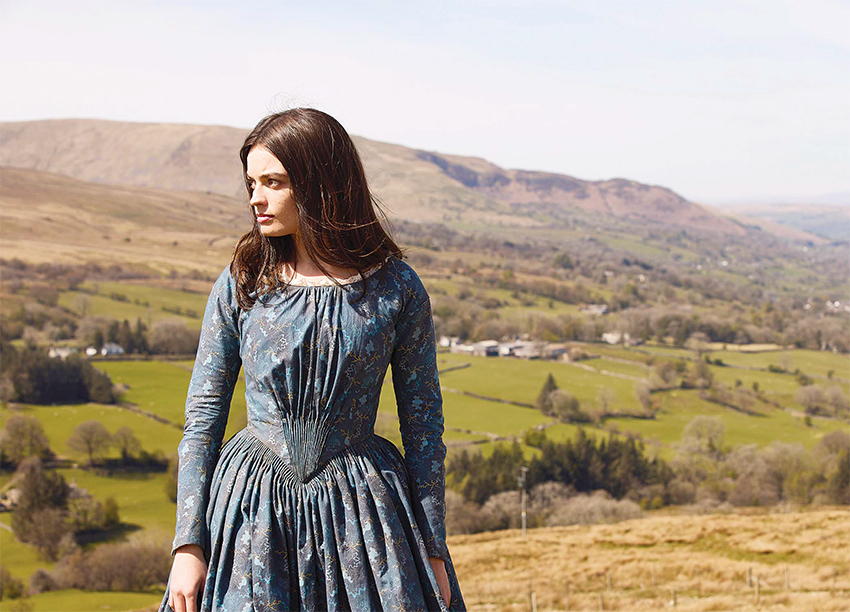19/02/2023
19/02/2023
That name on the book cover is our first warning bell. Only two minutes into “Emily,” a bold and audacious retelling of Emily Brontë’s life starring an uncommonly compelling Emma Mackey, we spy freshly bound volumes of “Wuthering Heights,” her only novel and life’s achievement. “By Emily Brontë,” the cover says. But Brontë fans and even some casual readers will know that Emily, like her sisters Charlotte and Anne, published at first under a male pseudonym, in her case Ellis Bell. It was both a bid for privacy and a concession to a Victorian society in which a female author could hardly expect to garner the same respect and deference accorded her male counterparts.

This change is the first - but not the most important - way in which writer-director Frances O’Connor, in a hugely impressive debut feature, reimagines the life of the “strange” Brontë, who died at 30, unable to give the world more novels and poems. Most brazenly, O’Connor gives Emily a love affair - fiery, forbidden and ultimately tragic - with turbulent passion unfolding on the windswept Yorkshire moors. Remind you of anything? These are the same “wily, windy moors,” to quote singer Kate Bush, where Heathcliff and Catherine lived their own doomed love.
O’Connor both tells the story of Brontë’s “Wuthering Heights” and places her inside it. Does it matter that this relationship - with Brontë’s real-life, hunky French tutor and town curate - is fictional, and that he was possibly involved with sister Anne? Again, purists will balk, but O’Connor has been frank about creating an augmented life for Emily, a story that is “part Emily, part ‘Wuthering Heights,’ and part things from my experiences.” So perhaps it’s best to see that name engraved on the book as O’Connor’s two-minute warning - if you’re looking for only recorded facts, she’s saying, stop while you’re ahead.
But actually, please don’t stop. The film poses a basic question: How did a sheltered young woman, a reverend’s daughter in the small village of Haworth, come up with the emotional bandwidth to create “Wuthering Heights?” It’s a question asked out loud by older sister Charlotte, who loves but is also violently jealous of her sister. “There’s something you’re hiding from me,” Charlotte says, demanding to know the inspiration of what she calls an “ugly” book. Emily, meanwhile, is deathly ill. She still manages a crafty smile.
Beauty
We now flash back to earlier years. Emily, despite her dark and brooding beauty, is a quiet soul, “the strange one” in Charlotte’s unkind words and an “odd fish” by her own description. Charlotte, the more socially and conventionally successful sister, thrives at school, where she is offered a teaching post. Emily tries to join her and fails spectacularly, suffering homesickness and soon returning home. “Is there something wrong with me?” she asks her brother, Branwell. Emily’s father assigns her a French tutor: William Weightman, a new curate who helps the reverend at church. The strappingly handsome young man (Oliver Jackson-Cohen) has at first a prickly connection to Emily, but things change when they study the universal language of love.
It’s great fun, by the way, to hear the conveniently French-born Mackey, a star of “Sex Education,” display rapidly improving French as she grows closer to her tutor. Sex education, indeed. Mackey is perfectly cast. When her hair is down, as when she runs in the rain on the moors, or rolls down hills with her beloved Branwell (an excellent Fionn Whitehead as the loving brother who ultimately sinks into opium addiction), we could be in 2023, so contemporary is her look. But put her hair in a bonnet and listen to her speak, and we’re transported to the 19th century in a fl ash. The young actor’s versatility over more than two hours, as she experiences passion, lust, anger, heartbreak, grief, ambition and more, is something to behold. In O’Connor’s telling, it is clearly this lived experience that forms the basis for the book Emily finally sits down to write. Which raises another question: Is O’Connor arguing that one can only write what one has lived - that a famously fertile imagination is not enough? O’Connor’s own explanation is broader, though.
She has called “Emily” her love letter to young women of today, who, she hopes, will respond to its celebration of one’s authentic voice and potential. And that they’ll allow themselves to be, essentially, imperfect. Or, we could say, “strange.” Emily asks Branwell if he thinks she is strange at one point, and he responds: “Everyone’s strange if you look at them for long enough.” Luckily we get to look long and hard at this Emily, brought provocatively to life by O’Connor and her star. Strange or not, it’s hard to look away. “Emily,” a Bleecker Street Films release, has been rated R by the Motion Picture Association of America “for some sexuality/nudity and drug use. “ Running time: 130 minutes. Three stars out of four.
By Jocelyn Noveck


